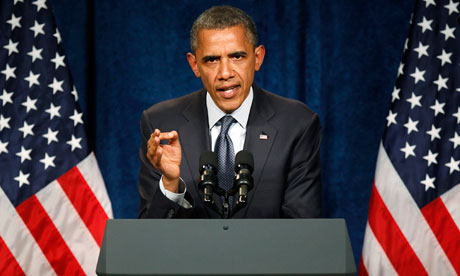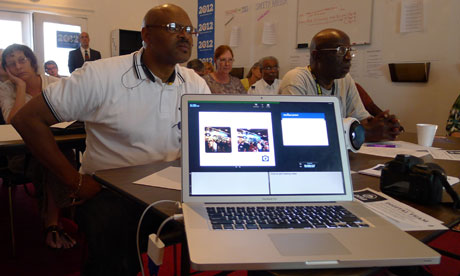Obama campaign unleashes digital ad blitz in bid to see off Romney challenge
Data shows US president vastly outspending Romney in internet advertising, with GOP rival preferring more traditional approach

Barack Obama is vastly outspending his challenger for the White House Mitt Romney on internet advertising, pouring millions of dollars into attempting to sway online voters in a move that his campaign strategists hope will give him an edge in November.
New data compiled by the internet marketing research firm comScore shared with the Guardian shows that in April the Obama for America campaign placed more than 30 times as many digital ads as Romney's equivalent operation. Though Romney's digital team has promised to up its game as the presidential election approaches, their presence in the online political battlefield remains negligible.
ComScore records that Obama paid for 865m online display ads across the web last month. By contrast, the Mitt Romney for President campaign mustered barely 26m ads.
Romney's online presence is running at a level that the Obama campaign surpassed a year ago. By May 2011 Obama was already placing 70m online ads, and this January it vamped up its digital investment to almost 800m ads where it has remained ever since.
The new figures are surprising because April was the first month in which Romney was clearly the presumptive Republican candidate for the presidential election. Observers had expected to see a more aggressive attempt on Romney's part to play catch up now that the nomination was in the bag, but it has failed to materialise.
"We expected that Romney's activity would have ratcheted up at this point, but we are not seeing that. The early indication is that there isn't any major closing of the gap," said Andrew Lipsman, a comScore analyst specialising in political and digital advertising.
While the Romney campaign is managing to make serious inroads into Obama's overall fundraising advantage, most of the extra firepower it is accumulating appears to be going towards traditional campaigning techniques. In particular, Romney's team, flanked by several well-funded partisan Super Pacs led by Karl Rove and the Koch brothers, are gearing themselves up to unleash a blitzkreig of negative TV ads on the American electorate.
Obama is also expected to devote most of his warchest to traditional TV advertising. But he has also set aside a substantial portion of the 2012 coffers for more innovative attempts to involve and engage online voters.
Already in the 2012 election cycle, the Obama For America team, headquartered in Chicago, has spent $19m on online advertising – more than the entire amount spent by Obama in this area in 2008. The interactive marketing news site ClickZ calculates that at current rates OFA will spend $35m on digital advertising by November, though that could prove to be an underestimate.
 Experts say online advertising has the power to transform the nature of the 2012 election. Photograph: Ed Pilkington for the Guardian
Experts say online advertising has the power to transform the nature of the 2012 election. Photograph: Ed Pilkington for the Guardian Obama's online advertising strategy is being masterminded by Andrew Bleeker and Nathaniel Lubin, who are veterans of Obama's first run on the White House four years ago. After 2008, Bleeker set up his own private consultancy, Bully Pulpit Interactive, where he was joined by Lubin who has now circled back to lead the on-the-ground work on online marketing in the Obama re-election HQ in Chicago.
Bleeker and Lubin have set out how they see the challenge for digital media in the 2012 presidential election in a new book of essays that explores the way that political campaigns are changing in the face of technological innovation. They predict in Margin of Victory , edited by Nathaniel Pearlman, that 2012 will "blow prior campaigns out of the water".
As more money and staff are devoted to online marketing, they say, the 2012 cycle will finally achieve the aspirations of previous campaigns. The authors identify three ways in which online advertising has the power to transform the battle.
First, messages can be targeted much more tightly than TV ads to core gropus of voters, reaching down they say to the level of the "zip code or even, in some cases, the individual level, bringing custom solutions to the table that will match the distinct messages to specific audiences."
Second, campaigns will this year move their online marketing away from desktop computers and on to cell phones. That will be particularly important in reaching certain demographics, such as Hispanic voters, who spend a disproportionate amount of their online time on mobile devices.
Third, online video advertising is going to be huge this year. Unlike TV advertising, which can only be targeted to a city or region, an online video can be served to a voter with his or her precise geolocation and behavioural interests, greatly enhancing the relevance and the impact of the message.
"The 2012 election is very likely to be incredibly tight. Winning messages are going to be the ones that cut through the clutter – not just with memorable creative work but alos by being tailored to key segments," Bleeker and Lubin write.
Social media is also going to be an important part of the jigsaw. Obama again has a massive headstart in this area, having already amassed more than 26.7m Facebook fans to Romney's 1.8m followers.
A comScore study of the uses of social media by the presidential campaigns highlights the value of social media as a way of amplifying the candidate's message. In January, for instance, Obama bought 800m online display ads at a cost of more than $4m.
In addition, though, comScore calculates, Obama leveraged an extra 66m display ad impressions as a result of Obama followers passing on messages to their friends.
SOURCE: CLICK HERE to read more
Leave a comment and / or appreciate the article!
CLICK HERE to read more:» http://www.radio-elshaday.de/
CLICK HERE to read more:» http://www.radio-megapower.de/
CLICK HERE to read more:» http://christliche-radiosender.blogspot.com/
CLICK HERE to read more:» http://radiomegapower-nonstop.blogspot.de/
Posted by: Daniel Ioan Notar *DJ_DANY*
Keine Kommentare:
Kommentar veröffentlichen